July 14 Feature – Top Solo Artists
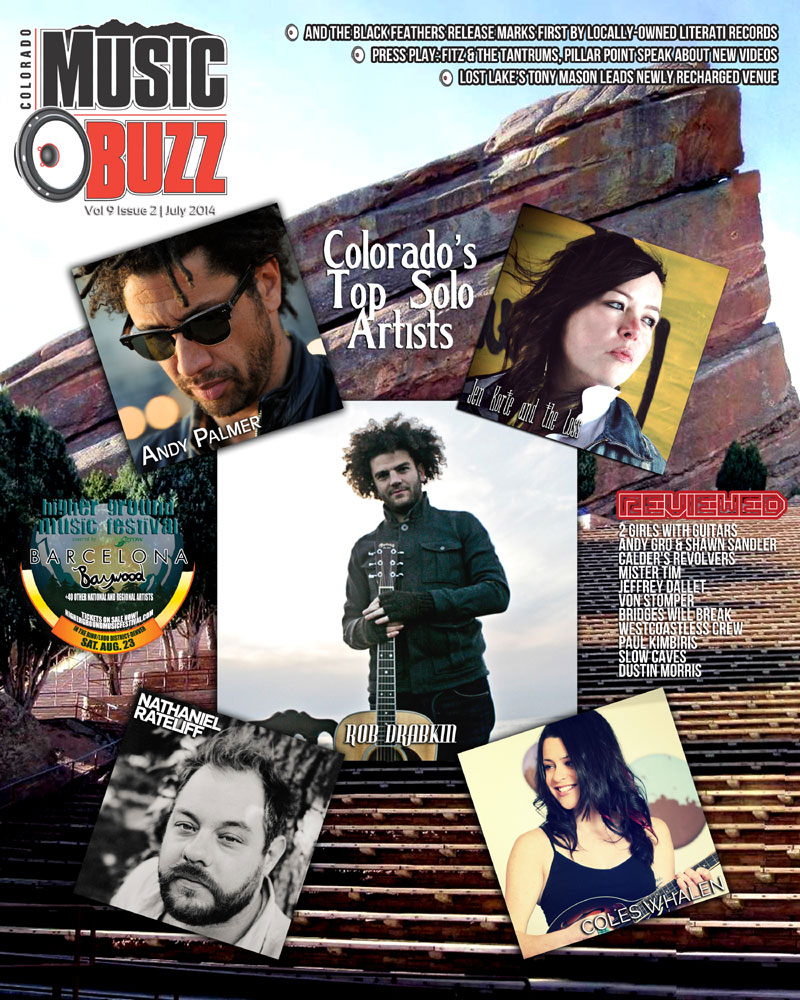

ROB DRABKIN
It begs for attention, begs to be looked at. Begs to be touched, rubbed, and caressed. Sometimes it is all poofed out in melodramatic fashion, wafting back and forth from ear to ear, while sometimes (although rarely) it is more subdued, letting that wide smile and deep laugh steal the attention for a moment.
NO, I am not talking about Rob Drabkin’s hair. I am talking about his music. Those eclectic, jammy, folky, fro’ed-out rock songs that have landed Drabkin in rotation at indie and college radio stations across the country and prompted multiple tours to support.
If you have attended any of his annual birthday bashes or other heterogeneous concert events around Denver, you know exactly I am talking about. But how did Drabkin get to this point, and what is it that so memorable about his sound? Is it the hair? I think not. It is, as evidence has shown, the fact that Rob Drabkin is the hardest working musician in Denver and master of marketing. If you have given him your phone number at any point in the last eight years, you probably receive a personal text reminder about his birthday bash each year.
His shows often feature guest musicians, sometimes including his father Harry Drabkin on saxophone. Currently, he gigs locally often with his band, but most of his touring is solo.
“I can do both, that’s the biggest thing,” Drabkin says. “The acoustic thing is no problem. There’s that ‘Are you guys available for this?’ and if not everyone is available, it can still be billed under my name.”
Drabkin however, prefers to gig with the full band. “For me, it’s like the challenge of evolving into the band image,” says Drabkin. “That’s what I’ve wanted to do more and more, is more band gigs and less solo gigs just cuz it fits the music better and there is such a good chemistry with all the players that I use.”
However, despite the ability to perform a gig solo if his band is not available, Drabkin says that marketing the music is more challenging as a solo artist. “It’s definitely harder,” he says. “When you go to one of the big songwriter places, like New York, or the Songwriter Café, and you look at the schedule, it’s all first name-last name. That can be daunting.”
“I think that Drabkin is a unique name,” he says. “There aren’t any other Drabkins doing music, so that can work in my favor.”
Rob Drabkin taken a path guided in part by indie radio support around the country, a result of his and his team’s strong marketing ability. He has been in the process of visiting many of the radio markets around the country that air his music and a few that he hoped to become a part of the rotation on. The idea, as he puts it, is to put a face with the music for not only the program directors and DJs, but fans in those communities. “We got a lot of support from AAA stations, and a lot of jam-band stations,” Drabkin says. “It has been a continual thing, it’s still going on. For a lot of these stations out of Colorado, it was like ‘Who the hell is Rob Drabkin?’ We had a lot of stations playing us, or interested in playing us, and it was time to visit them.”
In many of the markets, he would make an early morning appearance on a morning show, then do an afternoon show somewhere else, and then spend his evening doing another gig or driving to the next town for another morning show appearance. “It was like that for ten days and about fifteen cities,” Drabkin says. “As far as the whole radio approach goes in a lot of these stations, they wonder ‘Does he leave Colorado, and can he actually play. (It) made such a difference. Some of the stations that I wanted to get, added the record after I played.”
“It was a big PR tour,” Drabkin says. “Whether or not the stations are playing the album in full, heavy rotation, five spins a day, or whether they’re playing it once a week, the stations are so connected with the town. They are connected with the city and the talent buyers and the festivals and events. It was totally worth it.”
Drabkin made a drastic career change to pursue music full time. “I did an overnight switch from biochemistry into music,” he says. He was also teaching part time for Youth on Record, at the time Flobots.org, and eventually had to make the decision to devote all of his time to his craft. “I taught one day a week. It is an amazing organization, the students were so affected by it. But for me, it was one day a week that I could not commit to music. Even though it was one day, I couldn’t give it up.” He was trying to focus on two things, and did not feel he could give 100% to the students at Flobots.org and that that was not fair to them, so about four years ago he pulled the plug. “My biggest switch was leaving that opportunity.
Drabkin just dropped a music video that premiered in Relix magazine. Catch him live upcoming at Winter Park Soulshine Festival with G-Love & Special Sauce on July 5, part of the tour he is doing with them. All Colorado dates will feature the full band.
Online: robddrabkin.com
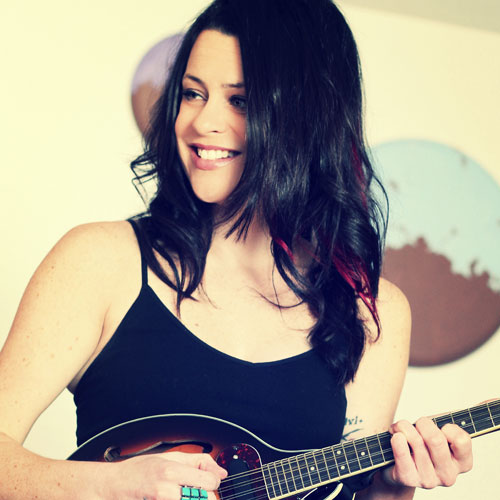
COLES WHALEN
Coles Whalen has been hitting it hard since 2005, when she dropped her first EP and hit the road to support it. Five albums more and a deal with XMG Records are some of the physical successes she has accomplished, but Whalen has also learned a lot about the music business. Colorado Music Buzz caught up with her to get the latest word.
CMB: What are the benefits of working with only one or two band members as opposed to an entire group?
CW: For several years I toured full time with my band, and as much as I loved it, it just became too expensive. We play in Denver with the band every few months, but most of the time I play as a duo with my bassist/cajonist Kim O’Hara.
CMB: Was there a point where you decided to leave a job or something else behind to pursue music?
CW: When I finished college I launched myself straight into the music world, living in a camper and touring full time. That was over ten years ago. These days I’ve been trying to balance music and working a few other side jobs.
It’s tough! I’ll be using the money though to record a new album in the fall.
CMB: What are some of the biggest challenges facing you as a solo artist compared to playing in a band, and how do you deal with them?
CW: It is much harder to stand alone in front of a crowd and play your songs. I feel like playing with a band has made me a better musician, and I love doing it as much as possible. Playing alone forces me to really connect with the lyrics I’ve written and I think there are a lot of people that truly appreciate acoustic music.
CMB: What promo techniques have you found work best for you?
CW: I have been trying to use every avenue possible, but nothing is ever as good as a personal message to someone. I make sure all of my sites are updated and I use my mailing list a lot as well.
CMB: Any defining moments as a musician?
CW: I’ve tried not to let the failures and successes define me. Sometimes after the high of a really amazing show I feel like I can do anything I put my mind to. Often times the next day I’m struggling to pay bills and life comes back full force. I think my most defining moments have been the times I’ve pushed through the lows, even when I have felt like giving up. I’m in this because it’s what I love to do, regardless of the outcome.
CMB: What is coming up for you this summer?
CW: I have a few short tours booked, including teaching at Girls Rock Des Moines, but for the most part I will be spending the summer writing new songs and playing around town. The next big show will be at the Hard Rock Cafe on Aug 1st.
CMB: Where can we find your music online?
CW: www.coleswhalen.com is where it’s at! I also have all of my music on iTunes, Pandora, Spotify and of course Facebook.
CMB: Any pre-show rituals or habits?
CW: I do a few vocal warm ups, and my pre show ritual is The Search for My Pick. I usually celebrate afterwards with a drink with friends.
Online: facebook.com/coleswhalenmusic
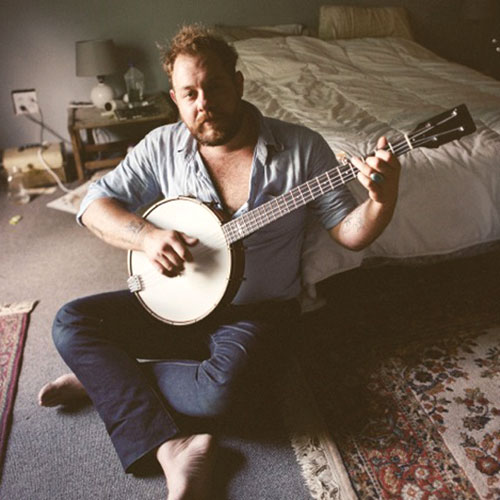
NATHANIEL RATELIFF
Branding your name is a tough thing for any artist to do. Separating that name from previous work can be an even bigger challenge. Nathaniel Rateliff is doing just that with his current group and side projects, howevr, performing under the name Nathaniel Rateliff and putting out a folk-indie style that isn’t just catchy, it’s addicting. Rateliff cut his chops in notorious Denver group Born In The Flood, but since the group has called it quits Rateliff has stuck to his own moniker and found success in a different light. With multiple recording projects and tours in the works for the group Nathaniel Rateliff (formerly known as Nathaniel Rateliff & The Wheels) as well as side project Nathaniel Rateliff & The Night Sweats, his schedule stays jam packed, and that is just how he likes it.
“It’s been good,” says Rateliff of post-BITF life. His group signed with Rounder Records and has put out the album Memory Loss in addition to another full-length record and two EPs. With as much as he has going on with the two different groups, he has links to each at nathanielrateliff.com for fans to keep everything straight. “We’ve been gone a lot,” says Rateliff. “You can’t complain about that, but there is something to be said for jet lag.”
“The rest of the summer is kind of mellow,” says Rateliff. “Which is kind of nice. We’ve been hitting it hard since September.” The group has hit the UK and Europe already this year, in addition to US tours and a one-off opening for Emmy Lou Harris in Salt Lake City on June 3. “All of it has been really good.”
His side project, Nathaniel Rateliff and the Night Sweats, is set to record a new record in August prior to embarking on a full tour of the US, UK, and Europe and hope to have the new record out by early next year.
Rateliff has made quite the name for himself coming out of Denver, and he wouldn’t want it any other way. No matter what level he is at, he has no interest in moving to New York or Los Angeles. “I don’t want to live in a bigger city,” says Rateliff. “I want to move to Pine. Now, as I get older, I kind of want to move back to the country and hunt, and have a great garden, and that sort of thing. I feel like if you’re doing something you love and you keep at it, it doesn’t really matter where you live. As long as you’re leaving town, people will find out about it.”
“The nice thing about living on the east coast or the west coast is that those are a lot of the bigger cities,” Rateliff says. “Denver is eight hours away from anything. But I still live there because I like it, I like Colorado.”
Being from Denver means a lot of touring if you plan on getting your music out to the masses, something Rateliff did not expect when starting out. “When I was younger, I didn’t think that I would have to tour so much,” says Rateliff. As he’s developed his music into a full career and repeatedly traveled much of the world, Rateliff has certainly learned that this is not the case. “But we played a show with Emmy Lou Harris recently. She’s still out touring and that’s amazing. Willy is still touring, Leonard Cohen still tours.”
“Scott Campbell was always great, so was Matt Lebarge,” says Rateliff. “Twist & Shout has always been really supportive. “(Radio) 1190, and now OpenAir 1340. I feel like there is a lot. Jim from 3 Kings Tavern has always been great.”
Rateliff will likely not be performing at the Underground Music Showcase this year, as he plans to be working on the Night Sweats record during that time, but will have upcoming Denver show dates posted at his website. He also has an EP coming out with his main group, Nathaniel Rateliff, which will be available at the website as well.
Online: nathanielrateliff.com
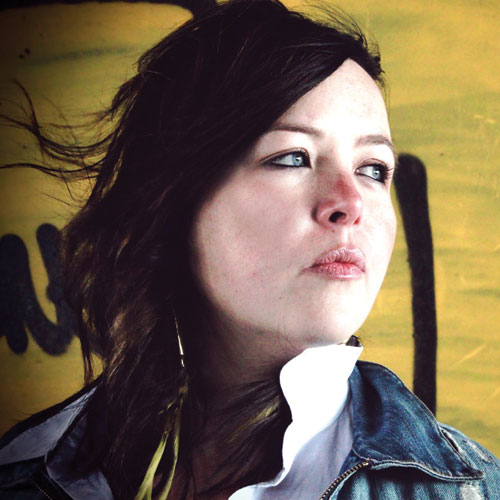
JEN KORTE
Jen Korte will be gracing the stage at Higher Ground Music Festival August 23, and has been increasingly making a nice name for herself in the local scene. CMB took the opportunity to pick her brain about music, accomplishments, and upcoming endeavors.
CMB: Why do you choose to work solo some or most of the time?
JK: When I started playing music here in 2005, I was playing by myself all the time. Back then I took a lot of pride in feeling like I could really hold the stage by myself. I’ve grown so much as a player that for me, playing with the band is just more enjoyable. I do think it is important for me to keep playing solo sets but I wouldn’t particularly say I play out solo very much anymore. I do really enjoy acoustic sets between Jess (DeNicola) and I or Jess, Julie and I (Jessica DeNicola is our vocalist and Julie Beistline is our violinist). We seem to connect with the audience more when we are stripped down to just a violin, an acoustic guitar and two vocalists. I do think however, that when you find band mates that really contribute to what you are doing or fufill parts that you hear in your head, it’s hard to let that vision go. Last year, we lived in the Caribbean for a few months and I felt naked as a jaybird playing out by myself. I worried about keeping the audiences attention for two hours or so with just my voice and an acoustic guitar. I feel that it was a very healthy challenge for me particularly because I wasn’t in my comfort zone at all nor did I know what kind of audience I was playing to. I think confidence is everything and reminding yourself every now and again that you believe in your own talents is a very beneficial process.
CMB: Was there a point where you decided to leave a job or something else behind to pursue music?
JK: You know, I have really swayed back and forth on that point for a long time. I personally have never just relied on music to pay my bills because it is such a hard thing to do these days. There seems to be a million more people trying to “make it” and the venues know that so they are not inclined to pay musicians nearly what they should. If you have hungry bands that are willing to play for free or willing to pay to play, then that makes it really hard to compete with. Even my friends and fellow musicians whom I see having successful tours, are still struggling to make the money that they are worth. It’s a tough decision to take that leap of faith. It seems like talent is irrelevant a lot of the time and more about the marketing or who you know. I have a partner I am trying to build a life with. I never want to feel like my contribution is not enough financially but that’s me. I have a lot of respect for my fellow musicians who can make money playing and I see how hard the hustle is for them. I have also never just been a musician, I have always been a performer so my commitment level to just music varies on how hard I am working on other projects or aspects of my creative side.
CMB: What are some of the biggest challenges facing you as a solo artist compared to playing in a band, and how do you deal with them?
JK: As I said earlier, being able to play with just a guitar by yourself for an extended period of time for a random audience can be very challenging. I think if you feel comfortable with the bill and you know you are playing for fans that specifically came to see you, a solo acoustic set can be like a rare feature. The other side of that coin is being drowned out by an audience because you are a random chick in the bar with a guitar. Finding a pace and reading your audience is an important tool to have. Playing with a band allows you more leeway to steer the audience in the direction or mood you want them to be in. Playing with great musicians starts to make it an experience.
CMB: What promo techniques have you found work best for you?
JK: To be honest, promo is where I am lacking. I am not sure what the best avenue is for promo in the internet day and age. People have so many opinions about what works. You gotta have a video, a million web sites, a million followers on twitter etc… I may be exaggerating a little bit but you get my point. What is the right formula? I think good old-fashioned playing out and having music on hand to give people is the strongest route. I can’t tell you how many times someone has put a song of ours on a mix and how effective that is. Finding the right person the represent you and help build your market is extra important as well. We are still looking for that person so let me know if you’re interested.
CMB: Any defining moments as a musician?
JK: Well I have had many beautiful moments that I could say are defining. They are the little pieces I keep in my heart when I am self doubting about whether or not to keep playing out. I think that gets heavy sometimes as I get older. One of them is selling out the Walnut room for our album release in 2009. My family was there. I think that was the first time they realized that I had an understanding of what I was doing and that my community supported me.
I would consider meeting Jess and eventually Julie as defining moments to me because they have helped me shape my sound. Jess has been singing with me for 8 years now. That’s a significant amount of time to develop musically with someone. At the time, I didn’t know what I sounded like or where I was headed. People loved me or thought my voice was abrasive. Jess taught me how to take the edge off and a lot about voice control. Julie and I met while I was in the Caribbean. We played 3 or 4 hour gigs just the two of us sometimes and she has taught me you don’t need a full band to be captivating.
If you’re speaking in the traditional sense, I haven’t gotten to play Red Rocks or to thousands of people at one time, but I have had the pleasure of playing with people I grew up listening to. That’s an intense feeling. The first time I played with Gordon Gano, I didn’t believe it was him until the first note came out of his mouth and then came the welled up tears of disbelief. Other artists have been in and out of my life, staying at my house, or playing music in my living room from time to time. It’s the secret moments sometimes that are more important that the obvious ones, you see ?
CMB: What is coming up for you this summer?
JK: This summer we are writing and looking to record at least an ep. You can find us at Higher Ground Music Fest, the UMS, and The Friday concert series at Beaver Creek. We are going to start more booking towards the end of the summer but really needed the time to get some ducks in a row and are considering rebranding the band and changing the name. More on that TBD.
CMB: Where can we find your music online?
JK: Check us out at www.jkandtheloss.com or www.reverbnation.com/jenkorteandtheloss

ANDY PALMER
Inspiration can lead to big things. It can also lead to big changes. Picture, if you will, yourself- as a young rising star in the legal world, living it up in Brooklyn, New York and partying like its 1999. You have a beautiful wife, love the city life, and have recently rekindled that bright fire that used to light up your soul- being a performing musician.
The fire grows like philodendron surrounding the soul. A plan emerges, between husband and wife, to move to the Mile High City. Start fresh. Over a short amount of time this idea becomes solidified. An emotional melee resulting in an uplifting agreement between the two.
Here you have the tale of local rocker Andy Palmer, a rising star not only in the solo acoustic world but also with his band Grub Street Writer. “The agreement was, I’ll relocate, but I want a year to go back into music and to put the law away, hopefully never to return,” says an enthusiastic Palmer, wholly unable to hide the smile on his lightly tinted face as he sits sipping coffee at a hip Uptown coffee shop, eagerly sharing his life’s story of pursuing passion.
“I quit law,” Palmer says. He was working as a public defender in Brooklyn when he and his wife decided to relocate to Denver. Palmer was not a huge fan of the idea immediately but the music community here in Denver and his diehard approach have made it worthwhile. “It turned out to be a great thing,” he says.
This has all come after Palmer’s original attempt at being a professional musician, which was prior to law school. Partying and a lack of knowledge of the business side left Palmer disgruntled and broke, and found him living alone in a yurt in Maine for six months. “That was a huge period of my life,” says Palmer. “That was following a stint in music and trying to make it work. Partying a lot, and I just had to get away and check-in with myself a little bit. At the time I was reading Gandhi’s biography, and all of my heroes in life all said ‘Go spend time by yourself.’ I wanted to see what that was like and if I could do it.”
Moving to a new city and working primarily as a solo artist is not an easy task however. Palmer spent the first year here trying and failing to build a band, while also searching for gigs on his own. “Having to do everything on your own (is the biggest struggle),” says Palmer. “Booking, organizing practices, writing new songs, and working promo is all on you. You can’t divvy up anything. That is a lot more work than I thought it was going to be. That’s most of my days, that’s what I do.” It has helped Palmer approach music more professionally, however, and get himself into a routine that is solely based around his music.
“(I have) more of a regimented writing process, instead of just waiting for the muse,” Palmer says. “I used to write from this place of almost being down and out a bit, and once I realized I don’t have to write from that place I’ve been doing it more regularly.”
The approach also includes less partying and more professionalism, something many musicians could take a lesson from. “I prepare a whole lot more, instead of just getting up there and throwing out words,” says Palmer. “I’ve got a team around me now too, distribution team, PR team, and I’m starting to talk to labels about ideas. I feel like I’m playing catch-up since I took some time off.”
Palmer’s band Grub Street Writer also performs gigs around town, using Palmer’s songwriting to drive a folky-style of alternative with appeal from the hippie festival crowd to the smoky urban dive bar. “When I play with the band, they’re all professionals, so they all need their check at the end of the night,” says Palmer.
Palmer spent his first year in Denver trying unsuccessfully to put together a band with friends or other people he would meet. After that year of frustration, he made the decision to use pro musicians when he needs to perform a full-band gig. “I opted to go for the pros instead of try to develop a band. I tried to go with this organic growth into a band of brothers, but I just cycled through a ton of people and it was a waste of time. When I finally decided to go and use pros, it was night and day.”
The problem with using pros is that, unlike the group of young kids that come together to form a rock band, they aren’t satisfied with merely playing for a bar tab. They need a paycheck at the end of the night, which makes it very hard for Grub Street Writer to put together a tour. “That’s one of the drawbacks of working with the pros is figuring out how to make it financially sound,” Palmer says. “How to get on the road, pay their bills and come off tour with something in my pocket. Hopefully next year, a spring tour would be great.”
Palmer will be hitting Immersive Studios in July to lay down two new hard-hitting singles to lay the ground work for more recording throughout the fall and winter. “I’m going to be doing a couple more rock singles,” Palmer says. The songs will be released one by one. “They’re not gonna sit too well with some of the more acoustic-based stuff I’ve been doing. So we’re just gonna go in and see what we can do with these two songs.” The plan also includes music videos for both tracks. “Hopefully those will be out, both songs and video, by August, but that might be pushing it.”
Additional songs will be released in Spring, giving Palmer the entire winter to not only cut the tracks, but to hype them as much as possible and have them be released early in the year. “It’s harder to promote, that time of year,” says Palmer. “Everyone is settled into what’s already come out. Less time to promote, less time to tour and promote the release.”
2015 may also see Palmer spending more time on the road. A tour to the coasts under the Andy Palmer moniker is on his radar. He also hopes to make a big impact at South By Southwest in Austin. “We almost went down this year,” says Palmer. “We had a couple showcases lined up, but I wanted more. I wanted ten to fifteen showcases to make that trip worth it. I did it a couple years ago and it was basically a big drive, and for a set or two, I was like, ‘What’d I do that for?’”
In the meantime, Palmer will continue gigging around Denver regularly. Stay up to date on his schedule and recording updates at andypalmermusic.com
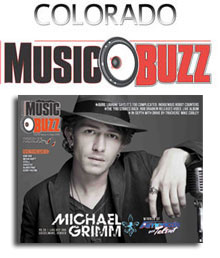


Recent Comments…